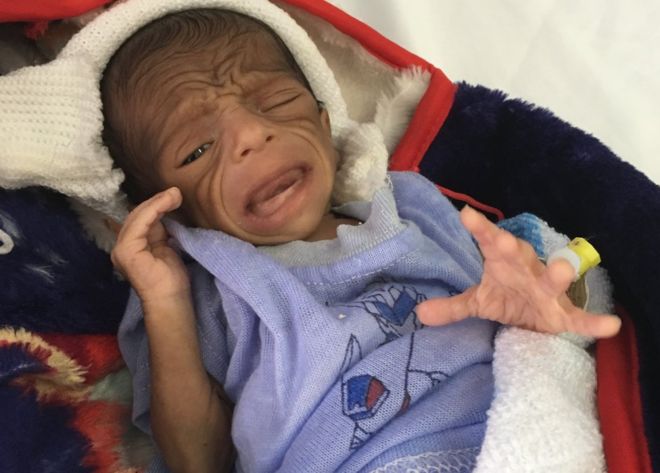
In the hands of the doctor, baby Ibrahim’s head seems impossibly small. He cradles the child gently, conscious of his fragility. Everything around him seems improbably large.
The nappies Ibrahim wears are the smallest available but are still too big. With his large eyes and hollowed out face, with ribs which press against his skin, the baby looks as if he is shrinking back into himself.
It seems perverse to describe a child in this state of as “lucky”. But Ibrahim has survived 21 days and doctors are hopeful he will endure. His twin brother died soon after he was born.
His mother, Wafaa Hatem, sits on the bed with her son, stroking his fingers when he cries.
Like three million other Yemenis, the family was displaced by the war. Their daily existence is circumscribed by the challenge of finding food to eat.
Ibrahim’s father is a taxi driver but with a collapsing economy he struggles to find customers.
“Sometimes my husband gets work,” says Wafaa, “sometimes he can’t find any. We eat sometimes, and sometimes we cannot provide anything.”
System disintegrating
It is one testimony from a war that has caused child malnutrition rates to jump by 200% in two years.
Fifty per cent of medical facilities no longer function. Some have been bombed by the Saudi-led coalition, others have ground to a halt because there is no funding.
Key roads and bridges are frequently attacked, making the delivery of assistance even more difficult.
The flow of aid is frequently held up by rebels who want to control its distribution. Many civil servants, including those in the health sector, have not been paid in at least four months.
Charities like Medecins Sans Frontieres (MSF) try to alleviate some of the distress but it is a huge task with such limited resources.
I met the MSF head of mission, Colette Gadenne, at the overburdened al-Jumhouri Hospital in Hajjah, one of the areas worst affected by the conflict.
“There is a system in place – feeding centres, nutritional programmes, but it is very difficult to monitor those programmes, and I fear that many families cannot just afford to even go, to even reach the facility, to be screened and to be admitted in the programme,” she said.
“The whole system is really collapsing, hospitals are closing regularly, so it’s very frightening to see how this country, which was already affected by poverty and poor governance, is going deeper and deeper every day.”
Walk the corridors of the hospital and the war reveals itself.
You see farmers who were on their way to market, shredded by the high explosives and shrapnel of a Saudi air strike; the children emaciated from malnutrition and disease.
Blind eye’
Out in the villages, among those too poor to afford the transport to hospital, people approach foreign visitors in the hope that they bring aid.
A boy brought his sick baby sister and crouched in front of us. An old man, not begging but looking at us with hope, had gathered his four hungry grandchildren.
Aisha Ali, who lost one child to malnutrition five months ago, presented her chronically ill four-month-old daughter Asma. The child’s eyes were yellowed from liver problems brought on by malnutrition.
“We need treatment, if you have. What do you have? Any treatment, any medicines? We need anything, we need medicines. If you can give us any, thank you,” she pleaded.
Local workers from the Save the Children charity run mobile health clinics in the area but they too are simply overwhelmed by the scale of demand.
The lack of clean water has deepened the crisis with a recent outbreak of cholera. There are countless cases of pneumonia and acute diarrhoea, which are devastating to vulnerable young lives.
The crisis in Yemen has been overshadowed by the wars in Syria and Iraq. Barely 50% of the funding promised by donors has actually been delivered.
The senior UN official in the country, Jamie McGoldrick, is clearly exasperated at the international response.
“The politics of the situation has overcome the humanity,” he says.
“The humanity doesn’t work anymore here. The world has turned a blind eye to what’s happening in Yemen… right now we are so under-resourced for this crisis, it’s extraordinary.”
On the waterless, baking plain at Al Manjurah in Hajjah governorate, 17,000 people live in shelters made of tarpaulin, straw and mud.
Mahdi Ali Abdullah exists here with his wife and nine children. “We are scared of the air strikes. We move from one place to another,” he tells me.
I struggle to hear his voice. His words make sense. They are formed in proper sentences. But all energy has been drained out of him. Only the war has any vitality left, trampling over the life of the nation.
END

Be the first to comment